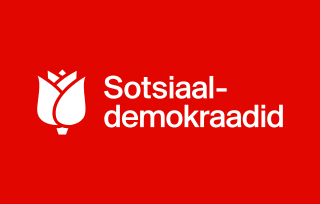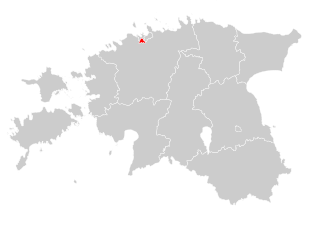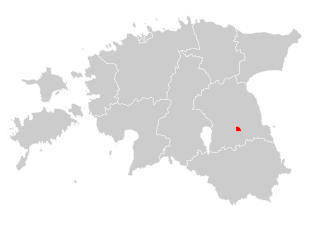
The Estonian Reform Party is a liberal political party in Estonia. The party has been led by Kaja Kallas since 2018. It is colloquially known as the "Squirrel Party".

The Social Democratic Party is a centre-left political party in Estonia. It is currently led by Lauri Läänemets. The party was formerly known as the Moderate People's Party. The SDE has been a member of the Party of European Socialists since 16 May 2003 and was a member of the Socialist International from November 1990 to 2017. It is orientated towards the principles of social-democracy, and it supports Estonia's membership in the European Union. From April 2023, the party has been a junior coalition partner in the third Kallas government.

Tõnis Lukas is an Estonian politician, former Minister of Culture from 2019 to 2021 and Minister of Education and Research from 1999 to 2002 and from 2007 to 2011.
Same-sex marriage will soon be legal in Estonia. The government elected in the March 2023 election, led by Prime Minister Kaja Kallas and consisting of the Reform Party, the Social Democrats and Estonia 200, vowed to legalize same-sex marriage. Legislation was introduced to the Riigikogu in May 2023, and was approved in a final reading by 55 votes to 34 on 20 June. It was signed into law by President Alar Karis on 27 June, and will take effect on 1 January 2024.

Jüri Ratas is an Estonian politician who was the 18th prime minister of Estonia from 2016 to 2021. He has been Leader of the Centre Party since 2016, and was the mayor of Tallinn from 2005 to 2007.

Isamaa is a Christian-democratic and national-conservative political party in Estonia.

The Estonian Olympic Committee (EOK) is responsible for the Estonia's participation in the Olympic Games.

The Ministry of the Interior of Estonia is a Ministry in the Estonian Government. The current Minister of the Interior is Lauri Läänemets.
The Estonian Athlete of the Year is an annual award presented by the Estonian Olympic Committee to one male and one female sportsperson judged to have delivered the best performance over the course of the year. The winners of the award, which was first conceived in the 1930s and has been presented every year since 1955, are chosen by an aggregated vote from sporting journalists, national sporting federations, and the public at large.

The following is an alphabetical list of articles related to the Republic of Estonia.
Urmas Arumäe is an Estonian attorney, associate professor at the Estonian Business School, and former minister of justice.

Urmas Reinsalu is an Estonian politician who served as Minister of Foreign Affairs from 2022 to 2023 and previously from 2019 to 2021. Before that, Urmas has served as the Minister of Defence between 2012 and 2014, and Minister of Justice from 2015 to 2019. Reinsalu is a member and current leader of the Isamaa ("Fatherland") political party, and was the party leader from 2012 to 2015.

The Ministry of Social Affairs of Estonia is a government ministry of Estonia responsible for social policies of the country.

Kaido Kama is an Estonian politician, conservationist, and teacher. He served as the Minister of Justice of Estonia from 1992 to 1994, as well as Estonia's Minister of the Interior from 1994 to 1995.
Märt Rask is an Estonian attorney, jurist, and politician who was the Estonian Minister of the Interior from 1995 to 1996, as well as being the Justice Minister in 1992 and from 1999 to 2003 and Chief Justice of the Supreme Court of Estonia from 2004 to 2013.

Electoral district no. 3 is one of the 12 multi-member electoral districts of the Riigikogu, the national legislature of Estonia. The electoral district was established in 1995 following the re-organisation of the electoral districts in Tallinn. It is conterminous with the districts of Mustamäe and Nõmme in Tallinn. The district currently elects eight of the 101 members of the Riigikogu using the open party-list proportional representation electoral system. At the 2019 parliamentary election it had 71,882 registered electors.

Electoral district no. 4 is one of the 12 multi-member electoral districts of the Riigikogu, the national legislature of Estonia. The district was established as electoral district no. 5 in 1992 when the Riigikogu was re-established following Estonia's independence from the Soviet Union. It was renamed electoral district no. 4 in 1995 following the re-organisation of electoral districts. It is conterminous with the counties of Harju and Rapla. The district currently elects 15 of the 101 members of the Riigikogu using the open party-list proportional representation electoral system. At the 2019 parliamentary election it had 133,437 registered electors.

Electoral district no. 10 is one of the 12 multi-member electoral districts of the Riigikogu, the national legislature of Estonia. The district was established as electoral district no. 9 in 1995 following the re-organisation of electoral districts. It was renamed electoral district no. 10 in 2003 following another re-organisation of electoral districts. It is conterminous with the municipality of Tartu. The district currently elects eight of the 101 members of the Riigikogu using the open party-list proportional representation electoral system. At the 2019 parliamentary election it had 67,525 registered electors.

Electoral district no. 11 is one of the 12 multi-member electoral districts of the Riigikogu, the national legislature of Estonia. The district was established in 1992 when the Riigikogu was re-established following Estonia's independence from the Soviet Union. It was renamed electoral district no. 10 in 1995 following the re-organisation of electoral districts but reverted to electoral district no. 11 in 2003. It is conterminous with the counties of Põlva, Valga and Võru. The district currently elects eight of the 101 members of the Riigikogu using the open party-list proportional representation electoral system. At the 2019 parliamentary election it had 70,706 registered electors.
Tiit Vähi's third cabinet was in office in Estonia from 6 November 1995 to 17 March 1997, when it was succeeded by Mart Siimann's cabinet.
















